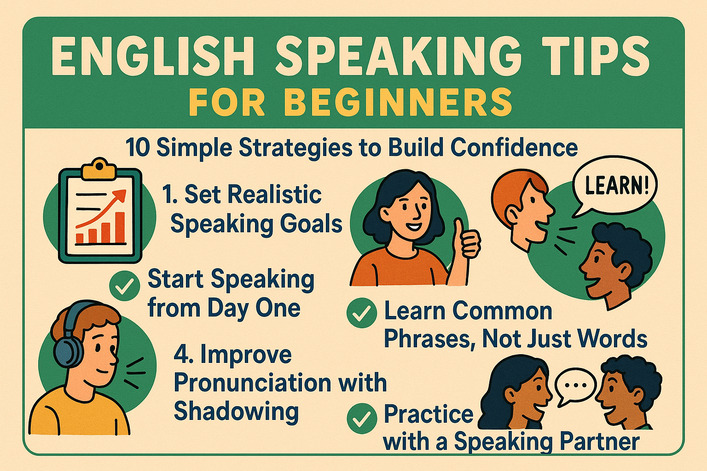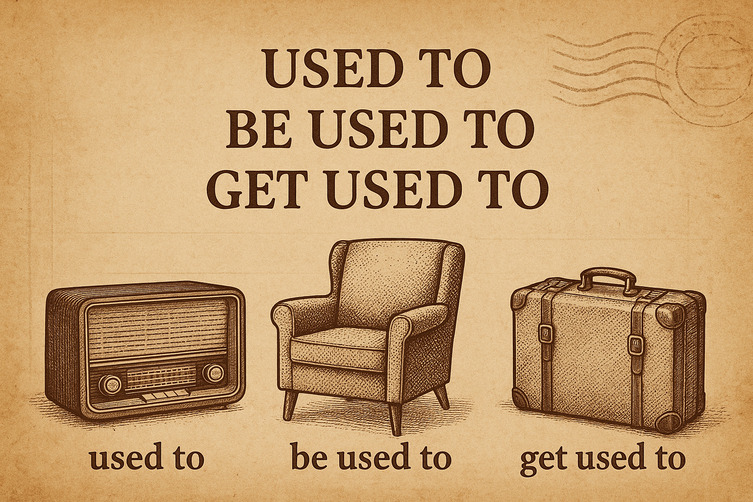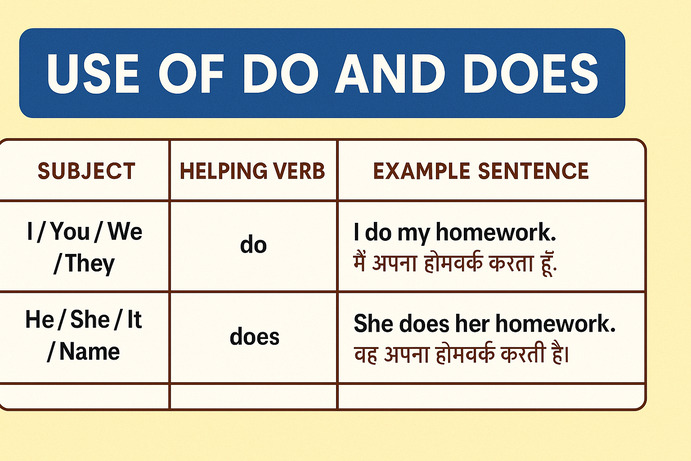Struggling to speak English confidently? You’re not alone. Many English learners feel nervous, stuck, or unsure when it comes to speaking in real-life situations. But here’s the truth—you don’t need perfect grammar to start speaking well. All it takes is consistency and the right strategies.
In this post, you’ll discover 10 practical English speaking tips for beginners. These strategies will help you speak more fluently, boost your confidence, and enjoy the process of learning English.
1. Set Realistic Speaking Goals
Learning to speak English fluently takes time, so don’t pressure yourself to be perfect from the start. Instead, focus on small, achievable goals that build your confidence step by step. For example, aim to speak English for just 5 minutes a day or learn five new phrases each week. These tiny habits add up quickly!
🎯 Quick Tip: Use tools like Notion, Habitica, or Google Sheets to track your daily speaking practice. When your goals are simple and consistent, speaking English becomes part of your routine—without feeling overwhelming.
2. Start Speaking from Day One
Don’t wait until you feel “ready.” The best way to speak English from the beginning is to just start—right now! Even simple sentences like “I am eating breakfast” or “It is sunny today” help build fluency.
Start small:
- Talk to yourself in the mirror
- Describe your actions as you do them
- Practice basic greetings and self-introductions
The more you speak, the easier it becomes. Remember, fluency isn’t built by silence—it’s built by practice.
3. Learn Common Phrases, Not Just Words
Learning random words won’t help much in conversation. Focus instead on useful, everyday phrases that you can use right away.
Try phrases like:
- “Can I ask you something?”
- “What does that mean?”
- “I’m learning English—can we talk?”
This approach gives you ready-made sentences, making it easier to respond naturally. Use apps like Anki or Quizlet to review phrase-based flashcards and strengthen your speaking skills.
4. Improve Pronunciation with Shadowing
One of the best ways to improve your English speaking and audio practice is through shadowing. This means listening to a native speaker and repeating exactly what they say, copying their tone and speed.
How to do it:
- Watch short English videos or podcasts
- Pause and mimic each sentence
- Focus on rhythm and pronunciation
Shadowing helps you sound more natural and confident when you speak English. Try 5 minutes a day—it really makes a difference!
5. Practice with a Speaking Partner or Tutor
Speaking to another person is one of the fastest ways to improve. Whether it’s a friend, tutor, or language exchange partner, real conversation gives you feedback and builds confidence.
Where to find partners:
- HelloTalk, Tandem for language exchange
- iTalki, Cambly for professional tutors
- English learning groups on Reddit or Facebook
💬 Can’t find someone nearby? Practice online! You don’t need to live in an English-speaking country to build fluency.
6. Record Yourself Speaking
Recording yourself may feel awkward at first, but it’s a powerful way to hear your progress. You’ll catch mistakes, notice hesitations, and build awareness of your speaking habits.
Try this:
- Record a 1-minute daily talk on your phone
- Choose a topic like “My day” or “My favorite food”
- Listen and track your improvement weekly
📓 Keep a Speaking Progress Journal where you reflect on what went well and what you want to improve. It’s motivating to look back and see how far you’ve come!
7. Don’t Fear Mistakes—Learn from Them
Many beginners worry about speaking incorrectly. But here’s the truth: making mistakes is how you improve. Every error is a chance to learn something new.
What to do:
- Write down frequent mistakes (like tense or word order)
- Ask a tutor or partner for corrections
- Practice those areas more often
🧠 Remember: Mistakes are not failures—they’re part of the learning process. The more you speak, the more confident you’ll become.
8. Build Vocabulary with Purpose
Instead of memorizing long vocabulary lists, focus on words you’ll actually use in everyday situations. This makes your learning faster and more relevant.
Start with topics like:
- Food and shopping
- Directions and travel
- School, work, and hobbies
Use a notebook or mobile app to review and revise often. A few useful words each day go a long way!
🔍 Related keyword: basic English vocabulary
9. Use Technology to Support Your Learning
There are so many free and affordable apps that make English practice fun and easy. The key is to use them consistently.
Recommended tools:
- Duolingo – learn basic phrases and grammar
- BBC Learning English – practice listening with real conversations
- FluentU – watch videos and learn naturally
Set reminders to use these tools daily, even if only for 10 minutes. It’s a great way to build habits and stay on track.
10. Join Online Communities for English Practice
Learning is easier when you’re not alone. Join online groups to practice English, ask questions, and stay motivated.
Where to connect:
- Reddit: r/EnglishLearning
- Facebook groups: “English Speaking Practice,” “Learn English Free”
- Discord servers for English learners
Being part of a community gives you support, feedback, and fun opportunities to speak with others!
Conclusion: Speak More, Worry Less
Speaking English as a beginner doesn’t have to be scary. Start with small steps, practice regularly, and focus on progress—not perfection. The more you speak, the more natural it becomes.
💡 You don’t need to be perfect—you just need to be consistent and confident.
Call to Action
Which tip will you try first?
Comment below and share your experience. Got a question or challenge? Ask away—we’re here to help!








